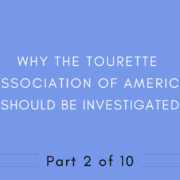Treating Tourette Syndrome and Tics with Self-Hypnosis
Jeffrey Lazarus, MD has been treating Tourette syndrome in patients with self-hypnosis for many years. He shared this report with ACN Latitudes:
Dr. Lazarus: This technique can be used as the primary treatment for the condition, or it can be combined with other therapies, including the use of medication.
Many parents are reluctant to have their children try traditional medications for treating Tourette Syndrome because they’ve researched the potential side effects of neuroleptics (tranquilizers), stimulants, and antidepressants. Reactions to some of these therapies can even be life-threatening. Surveys have shown that a high percentage of people find the medications intolerable or ineffective, and they often discontinue the prescribed drugs.
I find treating TS with self-hypnosis to be particularly gratifying. When patients can gain some control over his or her tics, it boosts their self-esteem and confidence. They can be spared much of the social embarrassment they may have been experiencing. I’m very enthusiastic about the potential for the use of self-hypnosis in this condition.
Please note that while self-hypnosis can be effective in the treatment of tics, it is not necessarily designed to treat other conditions that can be associated with Tourette Syndrome, such as: obsessive-compulsive behavior, attention deficit disorder (ADD), attention deficit hyperactivity disorder (ADHD), learning disabilities, immaturity, emotional lability, anxiety, self-injurious behavior, and personality disorders. Hypnosis is a tool, not a therapy in itself. If someone has situational specific anxiety, hypnosis can certainly help. However, if someone has generalized anxiety, then he/she needs to be seen by a therapist who is trained in cognitive behavioral therapy.
Treating Tourette Syndrome
I’m often asked what takes place when someone wants their child to be a patient. Typically, I first meet with just the parent(s) in our office, without the patient, to obtain medical information and a thorough background, and to explain how self-hypnosis works. Then, I send an introductory letter from myself directly to the patient. This sets a positive tone and gives the expectation that we will have a positive outcome with the youngster.
After my first meeting with the child, I give some “homework.” Follow up sessions include, among other interactions, watching a video of a child who overcame his persistent cough tic through self-hypnosis. It clearly shows how empowering this approach can be, and that the child in the video is happy during and after treatment. (Please see the questions and answers below for more information.)
Results of Treatments
Results of a recent study that I completed with Susan K. Klein, MD, PhD, were very exciting. The findings were recently published. We found that 79% percent of the children trained in this technique experienced short-term clinical response (tic control over the average 6-week follow-up period). Of those who responded positively, 46% achieved tic control after only 2 sessions and 96% after 3 visits. One patient required 4 visits.
Our website has several testimonials from patients I have worked with, or their families. I’ve included those below. Also, a select set of question and answers that deal with frequent concerns are below also. Readers who are interested in the technique of self-hypnosis can learn more on our site. Frequently asked questions are covered there.
Testimonials
The following treatments of Tourette syndrome took place while practicing in Ohio.
Nicholas’ story
We flew to Cleveland because Nicholas had reached the end of his rope. Our pediatrician had treated him with allergy medicines and a nebulizer before diagnosing him with Tourette syndrome. Then, a neurologist at a renowned hospital recommended that he take an anti-psychotic medication for his tics. His father and I decided this was not a road we wanted to travel, and we began to look for alternative methods of treatment. Fortunately, our research led us to Dr. Lazarus. We flew to Cleveland in search of an answer.
Our son’s first appointment went well and he was excited to return a month later. At his second appointment, he learned techniques to help himself to get better. He practiced his techniques daily. As his tics faded away, his self-confidence grew, his self-esteem improved, his performance at school improved and his spirit returned. Dr. Lazarus empowered our son with a tremendous gift that he will carry with him everywhere. We cannot begin to express our gratitude for the time and confidence he has given to our son.”
— Mother of 12-year-old Nicholas
Michael’s story
I can’t tell you the impact that Dr. Lazarus has had on our family. Our son, Michael, has always been a straight-A student, and he got kicked out of school for disturbing other people with a cough tic. It really disturbed him that he was disturbing others. Dr. Lazarus had such an impact. Our son doesn’t have any tics anymore. We are in the process of relocating to another city, but Dr. Lazarus is still our pediatrician regardless of where we live. If he asked me to come to the west coast on a red-eye to help support him, I’d do it. That’s how much he means to us.
— Father of 8-year-old Michael
Caroline’s story
When a neurologist diagnosed Caroline with Tourette syndrome, I went home and I started reading books and freaked out. As a parent, you think the worst. There was not a whole lot out there to help us figure out what to do about this, and I wasn’t big on medication. When my daughter was ready and said, “The kids are making fun of me — I want this to stop,” we called Dr. Lazarus. In two or three sessions, she was tic free-until we told her we were going to have another baby, and then she started all over again. But that’s a different story. We had a couple of tics then, too! My point is that Caroline’s life has been enhanced by this. And it’s a non-medication way to treat your child. The upside is vast and the downside is, I think, nonexistent.
— Mother of 6½-year-old Caroline
The following treatment took place in Menlo Park, California.
Brooke’s story
When we first discovered Brooke’s tic, she would describe it as a flinch. In the beginning it was very strong, almost seizure-like. But we didn’t want to jump to put our child on medication. Our pediatrician had heard Dr. Lazarus speak, and we thought it was certainly worth the trip, so we went to see him. Brooke loved him immediately and responded to him real well. It definitely has to be something the child wants to do. She picked one tic that bothered her the most and discussed it with him. They dealt with it. Most of her other tics have subsided. Instead of seeing a tic ten times a day, I see it once maybe every two weeks. It has really subsided, and she knows how to control it, and it’s a great feeling.
— Mother of 6-year-old Brooke









